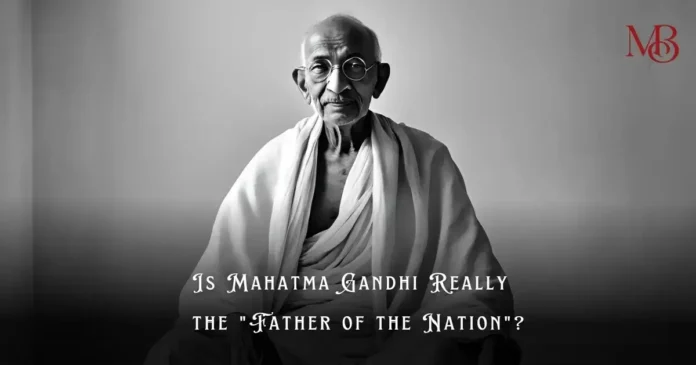Mahatma Gandhi was a name synonymous with the title “Father of the Nation” for the Indian nation. His life and times have come to symbolize not just Indian independence but also its spirit of resistance to British rule. But how did Gandhi become the father of the nation? Is it an official title? Let us dig into the reasons behind this name and analyze whether Gandhi truly deserves this title as the “Father of the Nation.”

Historical Significance of Mahatma Gandhi
Mahatma Gandhi was born on 2nd October 1869 in Porbandar, Gujarat. He led India through one of the most important periods of its history. His leadership in the Indian independence movement particularly by advocating for non-violence that included civil disobedience set the course of the country’s destiny. Gandhian movements like the Salt March mobilized masses of Indians and the Quit India Movement towards pursuing liberty without resorting to armed struggle.
Origin of the Title “Father of the Nation”
While Mahatma Gandhi is widely accepted as the “Father of the Nation,” the honorific title has never been formally bestowed on him by the Government of India. So far as I can trace the origin, the term “Father of the Nation” was first used during a radio broadcast from Singapore by Subhas Chandra Bose on July 6, 1944. Bose, no less of a leader in the freedom struggle of India, addressed Gandhi as the “Father of the Nation.” He justified all that Gandhi stood for and represented by his moral leadership for the cause of India’s freedom.
Gandhi’s Contributions to Nation-Building
Mahatma Gandhi’s contributions to nation-building encompass nonviolent resistance, unification of India, social reforms, and spiritual leadership.
1. Nonviolent Resistance: His principle of nonviolence was a revolutionary approach in a world full of violent conflicts. His method of passive resistance helped India gain independence without resorting to widespread violence and became a role model for future generations.
2. Unification of India He united diverse India, under caste, religion, or region, under one common cause of independence through leading people.
3. Social Reforms: Gandhi’s efforts were not merely for political freedom. He fought for social upliftment. He championed Dalit upliftment, to which he named “Harijans,” children of God. Campaigning against untouchability, promoting Swadeshi, or self-reliance, and advocating rural development gave him center stage in charting post-independence.
4. Spiritual Leadership: Not only political but the influence also became spiritual. Heeded by millions of Indians towards the truth, morality, and simplicity, he sealed his place as a national father figure.
Official Recognition of the Title
Despite the fact that people refer to Gandhi as “Father of the Nation,” there is no legal or constitutional provision in India that declares him as such. In fact, the Government of India has also confirmed through an RTI filed in 2012 that no official order or notification was ever issued for declaring Gandhi the “Father of the Nation.”
However, this title has been so widely used that it has almost become an informal title; school texts and government speeches so often address him with that name, and his legacy inspires millions all over the world.
Global Influence of Gandhi’s Philosophy
Beyond the geographical borders of India, the legacy of Mahatma Gandhi lies because his philosophy of nonviolence in governance inspired globalization leadership icons like Martin Luther King Jr., Nelson Mandela, and the Dalai Lama. Indeed, the principles of Gandhi have become a global movement for peace, justice, and civil rights.
Is Gandhi the Father of the Nation?
He was Mahatma Gandhi-the one who was an icon of independence for India, upholding the values of the non-violence and moral leadership doctrine who alone deserves to be termed as the “Father of the Nation.” It is not only Indian people whom he inspired but also influenced many across the world to strive for justice and equality in peace.
Gandhi’s moral leadership went beyond politics. He upheld the cause of truth, non-violence, and forbearance, persuading humanity in pursuit of inner transformation and social justice. He was against casteism; he fought for women’s freedom and economic equality. The teachings and philosophy of this leader inspire millions around the world toward a better and more peaceful society.
Although Gandhi was never considered the “Father of the Nation,” his contribution to the modern ethos of India and his continued relevance as a symbol of nonviolence and moral leadership across the globe cements him as a father figure not only for the Indian but for the whole world. His teachings and principles follow and guide people and movements so that his influence remains long into the future.
Resources to Support the Statement
Here are some resources to support the statement or we can say, the conclusion to the discussion:
1. Government of India – RTI Response on the title of “Father of the Nation” (2012)
2. Gandhi and Subhas Chandra Bose’s Relationship – Bose’s 1944 radio address from Singapore
3. Books:
Gandhi: The Years That Changed the World, 19141948 by Ramachandra Guha
The Essential Gandhi edited by Louis Fischer
4. United Nations on Gandhi’s Influence – Commemoration of International Day of NonViolence (October 2, Gandhi’s birthday)
You might also like: Gandhi Jayanti 2024: Honoring the Father of the Nation
He is the “Father of the Nation” in India; this title was earned for him through his huge contributions to the country’s freedom struggle and his fervent consistency in nonviolent resistance. From an examination of his extraordinary life and remarkable deeds, which continue to instill respect, it becomes clear why Mahatma Gandhi has such a special place in the history of India and in people’s hearts all around the world. The reach of Gandhi’s influence has gone far beyond the Indian geographical boundary as his philosophy of nonviolence has inspired movements and individuals around the world, leaving deep scars in the pursuit of justice and peace. For more such interesting stories follow our newscast page.


